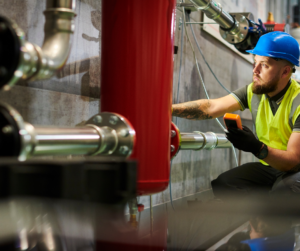
Proper maintenance of your heating boiler system is not a project that should be done — it’s a project that must be done.
Over a recent two-year period, Church Mutual customers have experienced 53 fires caused by heating system failures.
One of the biggest risks with boiler heating systems is that a problem will cause the internal pressure in the system to escalate to a point where it causes an explosion. This not only results in major physical damage to the facility but can be life threatening if your members or employees are in the building. The risk of this occurring can be greatly diminished with proper maintenance.
Maintenance is key to preventing heating system failure
The leading cause of heating boiler failures is “low water.” The trouble often begins with a small leak which then leads to a puddle on the floor, and ultimately, expensive damage to your system. If the low water situation is left undetected, it can be devastating. Besides not having heat in your building, the system could be damaged to a point where it needs to be replaced. The experts say operating a heating boiler with low water is similar to running an engine without motor oil — neither can operate for long without a serious breakdown occurring.
Preventive maintenance including periodic inspections of the heating system to detect leakage must be performed. If you notice you need to add water to your system, have an inspection performed as soon as possible. Corrective action can be taken to keep a minor leak from becoming a major repair.
In addition to low water, poor water quality is another major cause of heating boiler problems. Water treatment to combat corrosion is required for all low-pressure, steel boilers. If you have a cast-iron boiler, it is important to use pure water and to keep the system as tight (no leaks) as possible. The only way to determine the quality of the water used in your system is by sampling and testing.
Most heating boiler problems occur in the fall when the system is started up after an extended period of not being used. After its initial start-up for the season, monitor the system frequently to determine that all water levels and operating conditions are stabilized during this period. Don’t expect to fire the boiler at the beginning of the heating season and walk away for days or weeks.
To keep your system operating properly and safely, here is a checklist you can follow before and after you fire your system in the fall:
- All parts should be thoroughly cleaned and reconditioned as required and then tested before the system is put into regular service.
- During the heating season, the system should be tested once a week.
- Burner equipment should be cleaned and adjusted to give maximum efficiency.
- The heating surfaces, firebox, ash pit, casing and ducts should be cleaned of all deposits. Dirty internal surfaces not only waste fuel, they can lead to the burning, bulging, cracking, corrosion and even explosion of the system.
- The safety/relief valve should be tested for freedom of operation. These valves should be tested once a month during the heating season.
- All pressure and temperature controls and gauges should be checked to make sure they are working properly.
- All mechanical equipment, such as fans and pumps, should be inspected and properly lubricated.
- The boiler room should be kept dry and clean. Never store combustible materials in this room.
- A suitable record of the system should be established and maintained throughout the season. (See Boiler Inspection Log.)
ChurchInsure is a division of Anchor Insurance Agencies specializing in the unique insurance and risk management needs of religious institutions. Visit our website to learn how we can serve you at anchor-insurance.com/churchinsure.


